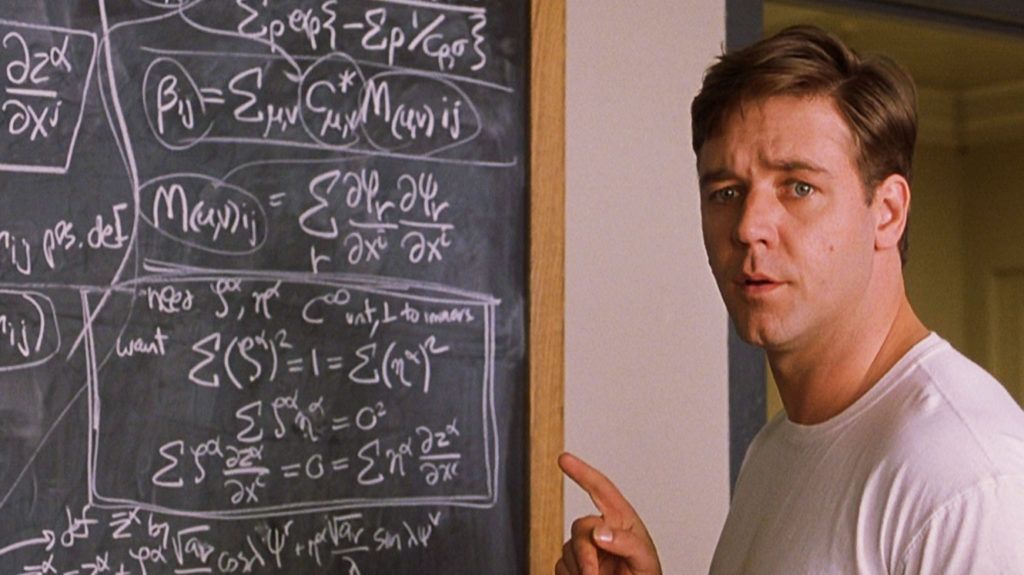The three secret language rules you obey without realising
Ever wondered why politicians flip-flop but never flop-flip? It’s just one of the obscure language rules you didn’t even know you knew.

Image: a maths genius who, like you, probably also knew more grammar than he realised. Courtesy Universal Pictures.
English is often regarded as one of the most difficult languages to master, and for good reason: for every grammatical rule to get your head around, there’s an exception waiting for you to stumble into its trap. But here’s the thing: you actually know more grammar than you think you do. That’s because grammar isn’t an arbitrary set of rules about how you can and can’t use words—even if that’s what most of us were taught (if we were taught anything at all).
Rather, grammar is something we intuit. It’s why anyone over the age of three knows to say ‘I want more chips’ and not ‘chips more I want’. And while there are all sorts of persnickety rules that are harder to grasp—many of which you can actually go ahead and ignore—the fact is we are, deep down, all natural grammarians. We understand the rules of our language the same way we understand gravity; instinctively, without sitting down to read Isaac Newton (or Strunk and White).
We even know rules we don’t know we know. Here are a few of them.
The curious age-old iron-clad rule of adjectival hierarchy
You may be hard-pressed to explain the phrase ‘adjectival hierarchy’, but you almost certainly know how to adhere to it. It’s the rule that says if you’re going to use more than one adjective to describe a noun, you have to list those adjectives in a very specific order: opinion, size, age, shape, colour, origin, material, purpose.
Sometimes called ‘prenominal adjective order’, adjectival hierarchy is why Joey Fatone Jr. had a supporting role in My Big Fat Greek Wedding and not My Greek Fat Big Wedding. And it’s why, as the writer Mark Forsyth explains in his book The Elements of Eloquence, “you can have a lovely little old rectangular green French silver whittling knife. But if you mess with that word order in the slightest you’ll sound like a maniac.”
Unless you’ve learnt English as a second language, it's unlikely anyone will have taught you about adjectival hierarchy. But you’ll feel it in your long white calcium-rich bones when someone gets it wrong.
Why we don’t chat-chit on TokTik
There is one notable exception to adjectival hierarchy: the Big Bad Wolf. In addition to eating small children, the villain of Little Red Riding Hood is guilty of flouting the rule that opinion (Bad) comes before size (Big). So why does our Wolf get away with it? Because he’s adhering to another law: the rule of ablaut reduplication.
As Forsyth points out in this piece for the BBC, ablaut reduplication is the reason why you’ve never listened to hop-hip music, zag-zigged down a ski course or heard the clop-clip of a horse’s hooves.
It has to do with what linguists call ‘reduplication’, a word-formation process where you repeat a word but change the vowel sounds each time. And so we chit-chat about flip-flopping politicians with our sing-song voices. According to this rule, if there are three words in the repetition, the vowel order has to go I, A, O (bish-bash-bosh). If there are only two, the order is I followed by either A or O (King Kong, tic tac).
Linguists are at a loss to explain why exactly this may be the case—it could have something to do with how our tongues work—but ultimately it doesn’t matter: it’s the law, and we follow it for fear of sounding like grammatical ding-dongs.
You abso-freakin-lutely know where to insert a swear word
We’ve been inserting emphatic words—usually rude ones—into the middle of other words for an un-effing-believable amount of time. The first recorded instance can be traced back to 1846, when some absolute joker described a church sermon as “theo-jolly-logical”. It wasn’t until the early 1900s that people began stuffing actual swear words into other words, and we’ve been cramming them in with fan-freaking-tastic regularity ever since.
While this grammatical quirk serves to make formal words feel more colloquial, linguists have given the practice a rather stuffy sounding name: infixing. Just as a prefix goes at the beginning of a word and a suffix goes at the end, an infix goes in the middle. And, as with adjectival hierarchy and ablaut reduplication, there’s a very specific rule that dictates where your swear word has to go: directly before the word’s most-stressed syllable.
Of course, because this is English, there is one exception: when your word has a negation prefix, like un-, you shift the emphatic insertion down a few syllables. Un-freakin’-beLIEVable.
And there you have it, the three weird rules of English grammar you didn’t even know you knew, but which you somehow did. Now that you’re officially across them, why not test your knowledge of English’s less intuitive rules with this grammar challenge care of grammar nerd and extreme genius David Foster Wallace? If nothing else, it should help to deflate that ego this article has worked to build up.
